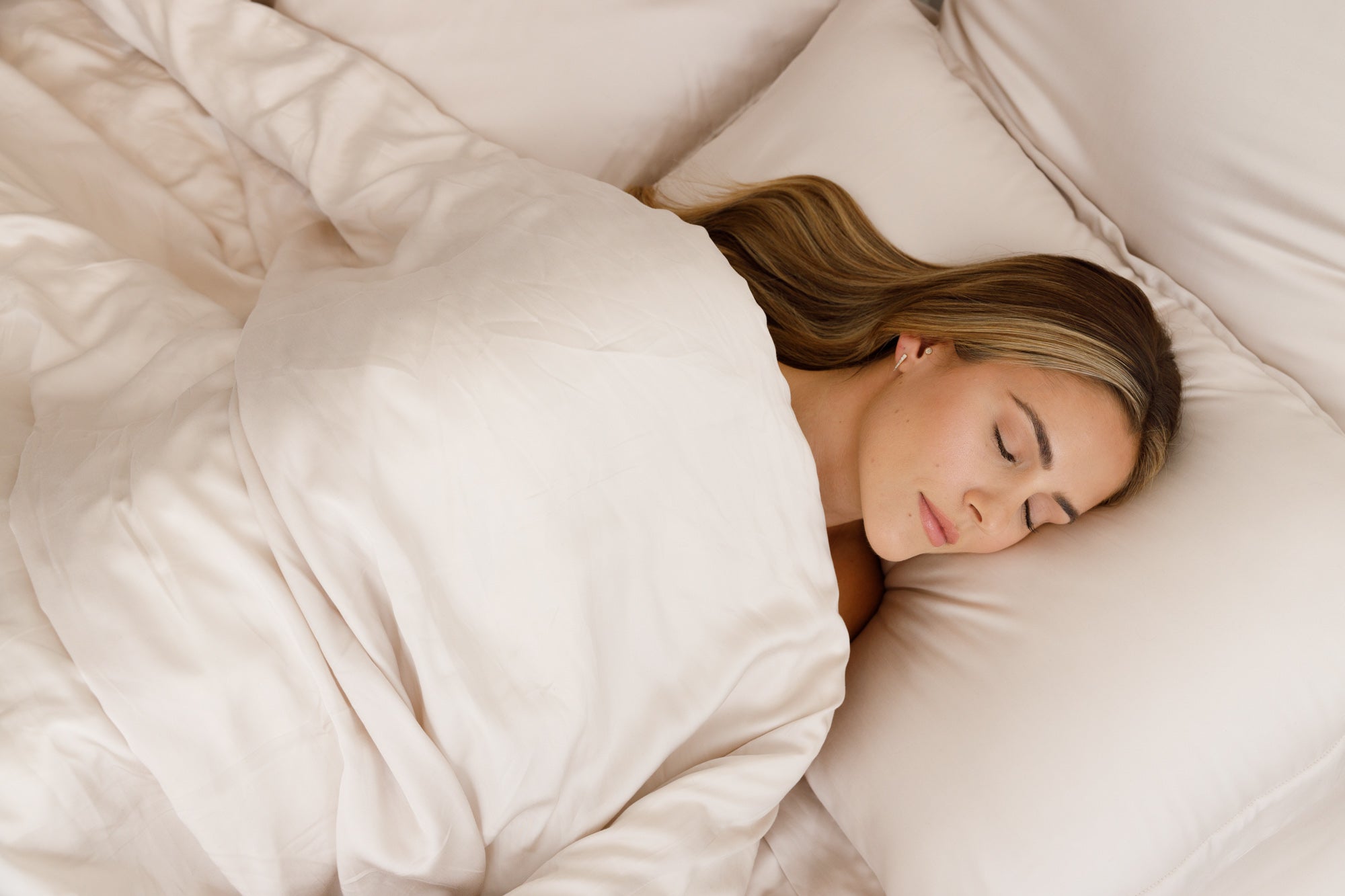Sleep is one of the basic requirements needed for human survival. It is essential for the functioning of both our minds and bodies. The ideal conditions for drifting off to sleep and staying asleep include low light levels, a quiet environment and cool temperatures.
One of the best ways to ensure a cool sleeping environment is by choosing the right bedding. Investing in bed sheets with cooling properties can transform an individual’s quality of sleep.
Cool BEDDING KEY QUESTIONS AND INFORMATION
- Ideal Sleep Conditions
- Dangers of Overheating
- Why You might be Overheating During Sleep
- How to Prevent Overheating Whilst Sleeping
- Cool Bedding
- Is Cooling Bedding Worth it?
IDEAL SLEEP CONDITIONS
Most people need a minimum of 7 hours of sleep and ideally 8 hours each night in order for the optimal functioning of their brain. Even limited sleep deprivation can have negative consequences on human health.
Room and body temperature can play a big role in sleep quality. Cooler temperatures allow us to fall asleep easier and keep us asleep throughout the night. A warmer environment can lead to insomnia, sleep interruption and the loss of precious sleeping hours.
So, what is the best temperature for sleep? The optimal temperature differs for each person depending on their internal body temperature. In general, the optimal temperature for sleeping adults is between 15.6 and 19.4°C.
Ideal sleeping conditions are also dark, quiet and comfortable. For the best possible night sleep, it is a good idea to remove any potential sleep interruptions by introducing black out curtains or turning electronics off.
DANGERS OF OVERHEATING
When the body is too hot when going to sleep or once asleep, there can be a variety of problems.
Overheating can cause heat exhaustion which is when the body cannot cool itself adequately leading to dehydration, nausea and muscle cramps. In extreme cases, heat exhaustion can lead to a heat stroke which can be deadly.
While extreme overheating is unlikely to happen in bed, it is possible to feel uncomfortable symptoms like weakness, dizziness, headaches and nausea when too hot. This is particularly likely during warm summer months, a heat wave or with certain body changes, illnesses or medications.
Heat can also actively prevent sleep. When the body enters sleep, the body temperature naturally drops between 1 or 2 degrees. In a hot environment, the body is prevented from dropping the adequate amount which can halt the process of going to sleep.
Night sweats describe when a person sweats so much that their clothes and bedding become drenched with sweat. They can occur for a number of reasons. Firstly, the temperature in the room or bed could simply be too hot.
Night sweats can also be caused by hormonal changes, illnesses or medications. They can be so extreme that they cause people to wake up in the night uncomfortable and sweaty.
Cooling bedding works to not only prevent you from getting hot but also to remove moisture such as sweat so that a comfortable sleep environment is maintained.
WHY YOU MIGHT BE OVERHEATING DURING SLEEP
Naturally Hot
Some people have a naturally hotter body temperature than others. The human body temperature is defined as 37.5°C which is an average and people’s natural body temperature falls in a small range around this figure.
The fluctuation is very small and any body temperature over 38°C is considered a fever. However, naturally warm people may find it harder to cool down to a comfortable temperature when sleeping, increasing the chances of night sweats.
Hormones
Part of heat regulation is done by the thyroid gland which generates and responds to hormones. When there is a hormonal imbalance in the body, it can disrupt the body’s thermoregulation patterns and lead to overheating.
Changes in hormones can be caused by medications, endocrine disorders such as hyperthyroidism or external factors such as stress.
Hormonal changes can also be caused by natural bodily changes. The menstrual cycle causes a fluctuation of hormones that can lead to overheating and body sweats.
The changes in hormone levels during pregnancy and the menopause are also a source of hormonal overheating. These occur as oestrogen levels drop and the brain responds by increasing body temperature.
Medical Conditions
Overheating is a potential symptom of a huge range of conditions that an individual may be dealing with. This can include various viruses such as HIV, cancers, infections, autoimmune disorders, neuronal conditions and psychological disorders.
Medications
Various medications can have heat increasing side effects. These range from common blood pressure drugs to antipsychotics and antidepressants. There are also many drugs that affect hormone levels which can in turn lead to overheating.
Drugs and Alcohol
After a glass or two of an alcoholic drink, you might notice rosy cheeks and a reduced sensitivity to cold weather. This is because alcohol can make the body feel warmer by causes capillaries to dilate. Although it might seem easier to fall asleep after drinking, the quality of sleep is much lower.
Many illegal drug substances also raise the body temperature in a similar way to alcohol. Additionally, stimulants can make it difficult to fall asleep at all.
HOW TO PREVENT OVERHEATING WHILST SLEEPING
There are a number of ways to prevent overheating in bed. There are even methods to control and deal with night sweats.
Perhaps the most obvious option would be to turn on the air conditioning or plug in a fan throughout the night. While this may prevent you from overheating, it can run up a hefty electric bill and is not great the environment.
Air conditioning can also dry out the air and remove humidity which can then dry out skin and cause skin conditions.
Other options include keeping windows open throughout the night, wearing lightweight clothes and showering before bed.
Each of these options slightly reduces the risk of overheating. However, opening windows won’t help with humidity levels and can introduce insects into the rooms. Wearing lightweight clothes will also be ineffective against potential night sweats.
The most effective way to keep cool at night is to invest in some cooling bedsheets. Not only do bedsheets prevent overheating, they can also absorb moisture from night sweats, keeping individuals comfortable and dry throughout the night.
COOL BEDDING
A set of cooling bed sheets can make a huge difference to an individual’s quality of sleep. There are two key qualities of bed sheets that gives them cooling properties: breathability and absorbency.
When bed sheets are described as breathable, it means they allow the skin space to breathe. Instead of sticking to the skin, they rest lightly around the body, trapping a layer of air and creating a comfortable microclimate that stays around body temperature.
Allowing the skin to breath prevents overheating. Non-cooling fabrics can be heated by the body and accumulate heat which leads to overheating. Alternatively, the space between prevents this negative feedback and also prevents excessive sweating that might be caused by night sweats.
Absorbency is an important quality in bed sheets. Moisture from perspiration caused by night sweats or overheating is wicked away from the body. This leaves the body dry and allows it to stay cool.

There are a few cooling fabric options available on the market. Some natural fabric options have good levels of absorbency and breathability such as silk and organic cotton. Natural fabrics have typically been the best choice; however, newer fabrics are beginning to dethrone them.
Tencel™, a semi-synthetic blend sourced from wood cellulose, is well known for its exceptional cooling properties. It has hydrophilic fibres which are ideal for wicking away moisture and regulating temperature even on hot evenings.
Non-cooling fabrics to avoid include artificial fabrics such as polyester and nylon. They have low absorbency and breathability and can result in an uncomfortably warm and damp night.
Cheap, low quality cotton is also an ill-advised choice. The short fibres reduce its absorbent properties and fail to wick moisture away from the body effectively
.

Browse Our Selection Of Bed Sheet Sets
IS COOL BEDDING WORTH IT?
Cool bedding can assist with night sweats and reduce their impact. Whether they are caused by medication, hormonal changes or illness, night sweats are notoriously uncomfortable and can cause a lot of sleep disturbance.
The body and brain wake up when temperatures are too hot and uncomfortable. Cooling bed sheets remove the moisture from sweats which keeps the body drier and gives it a chance to cool down. People are then less likely to wake up in the night and will have more hours of precious sleep.
Another surprising benefit of a cool sleeping environment is the possibility of weight loss. A cool setting for sleep can improve the metabolic rate and insulin sensitivity. Higher metabolic rates use up more calories which can be found by breaking up fat cells.
The most obvious benefit of cooling duvet and pillow set is the higher quality of sleep. With sufficient high-quality sleep, the brain is able to function at higher, faster levels.
Sleep-satisfied individuals will also experience better mood, less stress and will have lower risks of a range of diseases and psychological problems.








Share:
How Long do Germs Live on Bedding? A Guide to Bedding Hygiene
Designer Bedding - Is It The Right Choice?